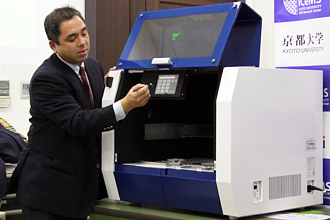Genetein, iCeMS Announce Launch of New Automated Epigenetics System to Evaluate ES, iPS Cell Quality

From left: Genetein president and Precision System Science (PSS) executive director Jun Akimoto, the SX-8G Compact, iCeMS professor and founding director Norio Nakatsuji, and NEDO Biotechnology and Medical technology Department director general Hirokazu Morita
5 February 2013
Kyoto, Japan -- Genetein Co., Ltd. and Kyoto University Institute for Integrated Cell-Material Sciences (iCeMS) recently unveiled a new automated epigenetics system, called the SX-8G Compact, for assessing human embryonic stem (ES) and induced pluripotent stem (iPS) cells.
ES and iPS cells can be manipulated into any type of cell in the human body, making them valuable models for understanding and treating diseases. However, one challenge facing the stem cell field is finding a way to pick out the good apples from the bad ones. Stem cells may behave differently if certain genes, DNA sequences that serve as recipes for making proteins in our bodies, are turned "on" or "off." The study of this type of regulation is referred to as epigenetics.
But to evaluate stem cells involves analyzing the operational status of over 20,000 genes, a tall task by any means. Individual genes can be activated or inactivated depending on the type of tag, known as DNA methylation, which is attached to DNA and serves as an on or off switch.
Genetein's automated system takes advantage of this tag property by distinguishing between genes that are turned on from those that are turned off, and isolates them in a self-automated manner. Once the DNA is analyzed, the end result is a highly comprehensive profile of the "on" status of genes for a given stem cell line.
"This new system has already been used to evaluate three ES cell lines," explained Norio Nakatsuji, the iCeMS' professor who headed the research and development, "and the results are reproducible and consistent."
Nakatsuji is hopeful that this system will help scientists to identify essential stem cell attributes that will drive their use in research and the clinical setting.
This research and development was made possible by support from the New Energy and Industrial Technology Development Organization (NEDO).
by Peter Gee, public relations URA (university research adnimistrator)
 |
 |
|
| Dr. Masaaki Takahashi, Genetein director, answers questions at a news conference (left) while Dr. Harumi Ginya, technical marketing general manager, performs a live demo (right). |
||
Related Links
 NEDO Press Release (Japanese)
NEDO Press Release (Japanese) Prescission System Science (PSS) Press Release (Japanese)
Prescission System Science (PSS) Press Release (Japanese) Genetein Co., Ltd. (Japanese)
Genetein Co., Ltd. (Japanese)
Related Media Coverage (in Japanese)
- KBS Kyoto "First in world! Automated iPS cell analyzer" (February 7, 2013 | 19:30)
- Yomiuri Television
 "First in world to develop automated iPS analysis system" (February 6, 2013 | 9:00)
"First in world to develop automated iPS analysis system" (February 6, 2013 | 9:00) - Yomiuri Shimbun
 "Kyoto U and others develop device that selects safe iPS cells" (February 2, 2013 | Page 34)
"Kyoto U and others develop device that selects safe iPS cells" (February 2, 2013 | Page 34) - The Nikkei Sangyo Shimbun "Epigenome analysis device developed by Kyoto U offers minimal error and can be placed on desktop" (February 6, 2013 | Page 7)
 The Nikkan Kogyo Shimbun |
The Nikkan Kogyo Shimbun |  Asahi Shimbun "Kyoto U and others develop 'epigenome' auto-analysis system" (February 6, 2013 | Page 26)
Asahi Shimbun "Kyoto U and others develop 'epigenome' auto-analysis system" (February 6, 2013 | Page 26)- Kyoto Shimbun | Yahoo! News
 "Kyoto U iCeMS and Manufacturer develop automated IPS system for analysis" (February 6, 2013 | Page 23)
"Kyoto U iCeMS and Manufacturer develop automated IPS system for analysis" (February 6, 2013 | Page 23) - My Navi News
 " Kyoto U and others develop automated system for epigenome analysis" (February 6, 2013)
" Kyoto U and others develop automated system for epigenome analysis" (February 6, 2013) - NHK:News610 Kyoto Daily "Fully automated gene analysis" (February 5, 2013 | 18:10)
